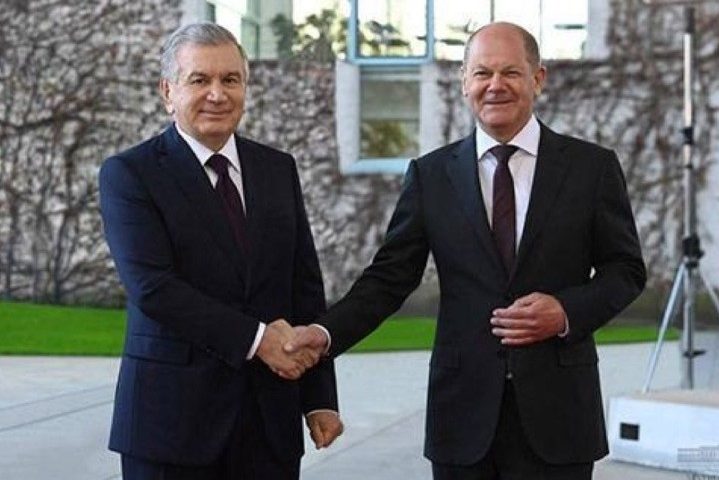AgroExpoUzbekistan / Agrotech Expo

Potential joint agri-projects between DLG and Uzbekistan
18.07.2022
EU to allocate a grant of €27 million for agricultural sector of Uzbekistan
10.07.2023President of Uzbekistan Shavkat Mirziyoyev was in Germany for the first time to meet with Chancellor Olaf Scholz and deepen commercial and trade ties with Europe on May 3.
Over the past five years, Uzbekistani-German bilateral trade has grown by 24% as Uzbekistan focuses on Germany as its best partner in Europe. An early development push was to promote Uzbek tourism, which has had a warm reception in Germany.
Since then commercial ties have been enhanced as German companies become increasingly interested in investing in Uzbekistan. In 2022, mutual trade growth was up by more than 51%, with Uzbek exports to Germany expanding by 21%.
German investments in Uzbekistan have reached a total of $5.5bn, with $4bn attracted in just the last few years.
Uzbekistan has 219 enterprises with German investments, including 97 individual enterprises. German companies such as Deutsche Kabel, Knauf, Claas, Papenburg and Falk Porsche are represented in the Uzbek market.
Leading companies such as Siemens, BASF, Thyssen Group, Roland Berger and Adidas Group are also collaborating with Uzbekistan.
Financial co-operation with leading German banks such as Deutsche Bank, Commerzbank and Landesbank have also been established.
With one of the youngest and fastest growing populations in the Commonwealth of Independent States (CIS), Mirziyoyev has been particularly focused on education, which is also an important area of bilateral Uzbek-German co-operation.
The Uzbek government has opened dozens of new universities and higher education establishments as part of its overall strategy of “adding value” to investments and commercial activity. In 2021, in partnership with Munich Technical University, the New Uzbekistan University was established in Tashkent, with Professor Wolfgang Herrmann as its Rector.
During her visit in October 2022, German Foreign Minister Annalena Baerbock visited School No. 60, an educational institution with in-depth study of German and named after German poet Johann Wolfgang von Goethe in 2019.
Mirziyoyev and Scholz signed agreements on new trade, investment and technological projects worth $9bn during their meeting. These projects are aimed at co-operation in the fields of green energy, mining, chemical, pharmaceutical industries, modernisation of transport infrastructure, digitalisation of agriculture, innovation and other priority areas. The German development bank KfW Bank, Deutsche Bank and the German Society for International Co-operation have agreed to provide full-scale partnership support to German companies operating in Uzbekistan.
The German-Uzbek Business Council meeting held in Tashkent last July was attended by more than 100 representatives of leading German companies. A roadmap for the implementation of investment projects totalling about €400mn was adopted as a result of this meeting. The Seventh Meeting of the Council was held in Berlin on February 28, 2023, which was attended by more than 60 representatives of leading German companies. The meeting resulted in the adoption of a roadmap for the implementation of the agreements reached.
Scholz also expressed his readiness to support Uzbekistan’s accession to the World Trade Organization (WTO) and the signing of the Enhanced Partnership and Cooperation Agreement with the European Union. Uzbekistan has already won preferential trade status for its exports of textiles to Europe that has seen export volumes soar, as bne IntelliNews has already reported in a special report Uzbekistan Rising.
An agreement was also reached to launch a dialogue platform in the Germany-Central Asia format.
Issues of ensuring regional security were also discussed during the talks. Mirziyoyev has said from the start that instability in Afghanistan is the main security concern in Eurasia and has been actively lobbying since before the war in Ukraine began for a UN-led initiative to help the war-torn country develop.
The Uzbekistan-Germany group for co-operation with the German Bundestag was set up in 2016, while the security group “Germany – Central Asia” has been active in the German parliament since 1994.
Resource: https://www.intellinews.com/

